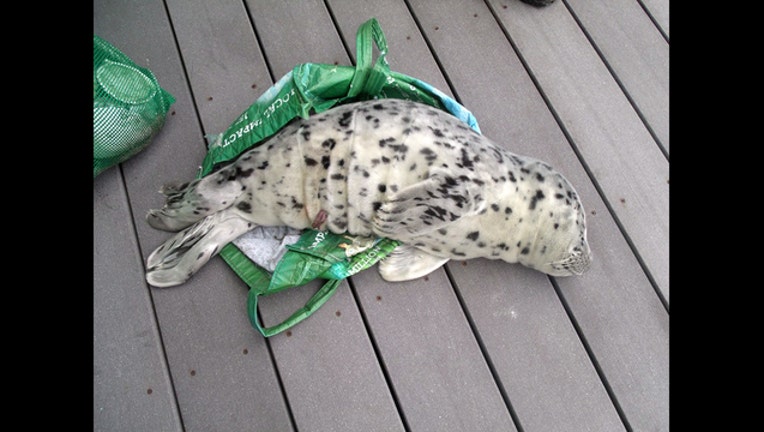NOAA reminding people not to touch or pick up seal pups

A baby seal is seen laying across a shopping tote used to carry it off a beach in Westport, Wash. Wildlife officials had to euthanize the harbor seal pup after it was determined to be unresponsive and lethargic.(Marc Myrsell/Westport Aquarium via AP)
SEATTLE (AP) — As harbor seals are being born in the Pacific Northwest, marine mammal advocates up and down the West Coast are urging people not to touch or pick up pups that come up on beaches and shorelines to rest.
At least five times this season, well-meaning people have illegally picked up seal pups in Oregon and Washington thinking they were abandoned or needed help, but that interference ultimately resulted in two deaths, said Michael Milstein, a spokesman with the National Oceanic and Atmospheric Administration Fisheries.
It's an ongoing issue along the entire West Coast, from Alaska to California, when people who think they're doing the right thing end up stressing or harming the animals instead, officials say.
State wildlife officials had to euthanize one harbor seal pup last month after a woman picked it up on a beach in Westport, Washington, and apparently carried it back to a house in a shopping tote. The animal was unresponsive and lethargic, Milstein said.
Another couple found a seal pup on the beach in Garibaldi, Oregon, and fearing the animal was abandoned, wrapped the seal in a beach towel, put it in their car and placed it in their shower at home, said Kristin Wilkinson, a NOAA Fisheries regional stranding coordinator. Wildlife officers returned that seal to the beach, but it was discovered dead the next day, she said. That couple received a written warning.
In California last year, there were at least 60 cases where people either illegally picked up or fed marine mammals, said Justin Greenman, NOAA's assistant stranding coordinator for the state. Some of those animals were re-released; others died in care or had to be euthanized.
Selfies with seals or sea lions are also a growing problem, he added.
People's impulse is to rush in and help, but it's better to let nature run its course, Wilkinson said. The risk in taking baby seals off the beach is that adult seals may abandon them. "The best chance they have to survive is to stay wild," she said.
Last month, in a case that garnered national attention, a Canadian man and his son loaded a bison calf into their SUV at Yellowstone National Park because they thought it was an abandoned newborn that would die without their help. The calf later had to be euthanized because it couldn't be reunited with its herd.
"This is our Northwest version, apparently," Milstein said.
NOAA Fisheries has launched a "Share the Shore" campaign to remind beachgoers to leave marine mammals alone, to stay at least 100 yards away and reduce other disturbances, such as keeping dogs on leashes. It's illegal to harass, disturb or try to move young seals or other marine mammals.
Wilkinson said they typically see six to 10 illegal animal handling cases a year, but this year they're seeing them earlier in the season and within a wider area.
Harbor seal pups are born along the West Coast, typically from February to May in California and from spring to late summer in the Northwest. They use beaches, docks and other shoreline areas to rest, regulate their body temperatures or wait for their mothers, who typically are nearby but may not come near the pups if there are too many disturbances.
Dr. Jeff Boehm, executive director of The Marine Mammal Center in Northern California, said so far this year 18 marine mammals have been brought to his center because they were harassed or illegally picked up. Most were eventually released into the wild after being treated but three have died.
"These animals have an innate charm. When you see one on the beach, they just draw you in. They're small. They're vulnerable," he said, but people should really pause, take a step back and call local authorities who know best what to do with them.
NOAA wildlife officers in Washington are investigating a number of cases, including one in which a seal pup born prematurely parked up on the beach and a homeowner placed the animal in a tote and removed it, worried about bald eagles preying on the seal and making a mess on the beach, Wilkinson said.
Last month, a seal wasn't illegally picked up but the pup was killed after wildlife officials determined that too much traffic and people on the beach meant that the mother was not likely to reunite with her pup.
In another case, a woman picked up a seal and briefly put it in her car before someone else told her to put the animal back on the beach, said Marc Myrsell, who directs the Westport Aquarium and whose staff responded to that incident. That pup returned to the water on its own.
Last week, a pup was handled so extensively at a beach park that wildlife responders determined the constant human interaction permanently separated the pup from its mother. People held the pup in their laps, cuddled it and pet the animal for many hours, she added. That seal was eventually taken to a rehabilitation facility.
With rehabilitation, "you're giving them a second start, but you might not be giving them all the tools they need," said Dr. Joe Gaydos, a wildlife veterinarian with SeaDoc Society. "They probably have a much better chance if they stay with their moms."
____
Marine mammal stranding network: http://goo.gl/OfNAaQ
NOAA Q&A: http://goo.gl/krI1ER

